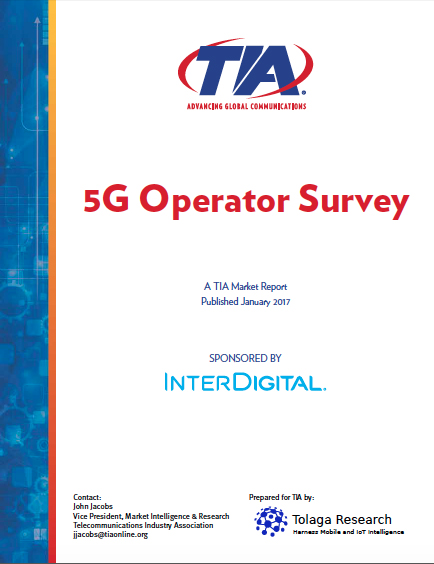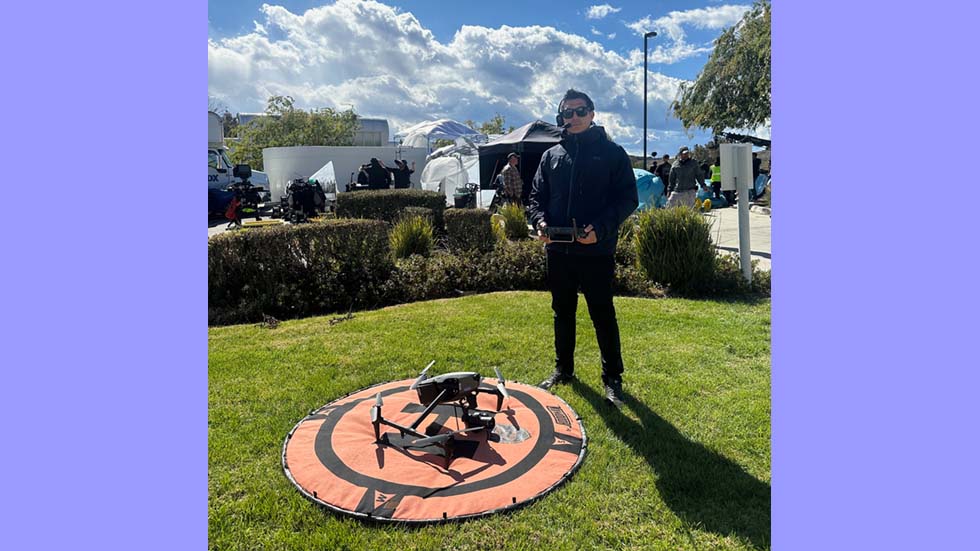Wireless Providers Bullish on 5G
NEWTON, MASS.—Of more than 30 wireless operators from across the globe comprising hundreds of billions in revenues, the vast majority have either commenced 5G trails or intend to within the next five years. This is according to a survey commissioned by the Telecommunications Industry Association (image linked to .pdf). 5G, for “fifth generation,” is the latest cellular transmission technology now in development but not yet standardized. It is expected to be significantly faster than the 4G and 3G technology that now prevails.
“5G needs to be a ‘chameleon’ technology that can adapt to differing demands of wireless services—whether to support high bandwidth, low latency, bursty traffic, ultra-reliable services, or a combination of these capabilities,” the survey said.
Among key findings:

- 32 percent of respondents have started technology trials, with another 26 percent planning to do so over the next 24 months.
- More than two-thirds are focused on radio versus network technologies.
- Almost one-third plan to launch pre-standard 5G products.
- Half expect to make 5G investments part of capex budgets by the end of 2020.
- One-third expect to deploy 5G services by the end of 2020.
With regard to creating 5G infrastructures, most respondents said they planned to partner with building owners or utilities. Most were interested in using unlicensed spectrum for 5G, with some looking at Wi-Fi offload, while fiber was the top choice for backhaul, with millimeter wave coming in second— based more on its developmental potential than its current reality—ahead of microwave.
“Although millimeter wave as a backhaul technology has languished due to line-of-sight alignment challenges, it is expected to benefit greatly from the technology advancements associated with 5G millimeter wave access technologies,” the survey said.
Although carriers are not quite sure yet what impact 5G will have, most believe it will be significant, particularly for categories such as autonomous vehicles, telemedicine in remote and emerging markets and industrial IoT or the “Internet of Things” in manufacturing; due to its “potential to enable massive connection densities and low-latency connectivity capabilities that can be used for closed-loop automation.”
In the United States, both Verizon and AT&T, the No. 1 and 2 carrier, are conducting 5G trials, with Verizon planning commercial deployments next year and AT&T doing a limited launch in Austin this year.
For more on 5G …
March 7, 2017
“Verizon Exec: ‘Meaningful’ 5G Deployments to Start in 2018”
Jan. 24, 2017
“AT&T Plans DirecTV Over 5G in Austin”
Nov. 11, 2016
“Facebook Does 20 Gbps Millimeter-Wave Broadband”
Nov. 1, 2016
“CenturyLink Cuts Copper in 15 States”
Oct. 6, 2016
“Verizon Launches 700 MHz Airborne LTE Ops”
July 14, 2016
“FCC Opens High Frequencies to Phone Companies”
July 14, 2016
“AT&T to Launch Flying Cows aka LTE Drones”
Nov. 18, 2015
“Ericsson: 5G Mobile Subs to Hit 150 Million by 2021”
June 3, 2015
“Unlicensed 3.5 GHz LTE Explored”
Jan. 26, 2015
“FCC Comments Urge Allocation of Spectrum Above 24 GHz for 5G And More”
Jan. 26, 2015
“Ofcom Consults on 5G Mobile Technology for the U.K. ”
Dec. 12, 2014
“Investigating Interference Between 4G LTE and Broadcast”
Dec. 5, 2014
“IBM, Ericsson Collaborate on 5G Antenna Designs”
Nov. 24, 2014
“ZTE and China Mobile Test World's First 'Pre-5G' Massive MIMO Base Station”
Nov. 24, 2014
“Millimeter Wavelength Radios, Advanced Laser Technology Provide Gigabit/second Links”
Sept. 28, 2015
“LTE-Unlicensed Spectrum Group Forms”
Sept, 22, 2014
“Xilinx, China Mobile Research Institute Partner on Virtualized 5G Network”
July 10, 2014
“Ericsson 5G Reaches 5 Gbps”
June 12, 2014
“Researchers Develop Innovative Solutions for 60 GHz 5G networks”
June 6, 2014
“Pasternack Releases New Line of Millimeter Wave Antennas
May 19, 2014
“5G Wireless Trial Planned in 15 GHz Spectrum”
May 20, 2013
“More Details Emerge on Samsung 28 GHz 5G Wireless Technology”
May 20, 2013
“Samsung develops adaptive array transceiver for 5G cellular communications”
Sept. 20, 2012
“FCC to implement PCAST recommendation for 3.5GHz band”
Nov. 20, 2009
“WCAI looks to 3.65 GHz band for wireless broadband”
Oct. 24, 2008
“Researchers in Singapore Develop New Antenna for Millimeter Bands”
March 8, 2005
“FCC Modifies Millimeter Band Rules”
Feb. 8, 2005
“New Process for Millimeter Band Link Registration”
Oct. May 2004
“FCC Designates Database Managers for Millimeter Wave Spectrum”
Feb. 17, 2004
“Millimeter Wave Spectrum Reallocated”
Nov. 10, 2003
“FCC Releases R&O with Service Rules for Millimeter Bands”
Oct. 21, 2003
“FCC Sets Rules for Millimeter Wave Bands”
Get the TV Tech Newsletter
The professional video industry's #1 source for news, trends and product and tech information. Sign up below.
